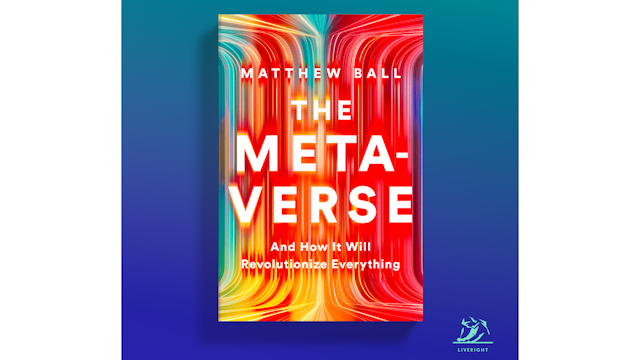Author Matthew Ball says 'the nature of the metaverse all depends on who pioneers it'
We all have questions about the metaverse. How can it improve our lives? How will it differ from the internet as we’ve come to know it today? How can we separate fact from fiction? In his latest book, Matthew Ball seeks to provide some clarity by exploring the past, present and possible future of the metaverse.

Matthew Ball's new book provides an in-depth glimpse into the burgeoning metaverse. (Credit: Matthew Ball)
Defining the metaverse in 2022 is a bit like trying to define the internet in 1992. It's even more difficult to make predictions about the future, given that the technology is still in its very earliest stages, and also given the fact that human beings don't have the best track record of predicting the future of technology. (Case in point: the original "Blade Runner" was set in 2019).
There are vague hints of what the metaverse will look like and how it might eventually shape the rhythms of our lives, but it's still too soon to know exactly how it will evolve. Nevertheless, Matthew Ball's newest book — titled "The Metaverse" — was written in an effort to provide a comprehensive definition of the metaverse, along with an overview of "how it will revolutionize everything" (the book's subtitle).
Here’s how he summarizes popular beliefs about the metaverse:
“To the extent there is a common understanding of the metaverse, it could be described as follows: a never-ending virtual world where everyone dresses up as comical avatars and competes in immersive VR games to win points, jumps into their favorite franchises, and acts out their most impossible fantasies."
And here's his own definition:
“Here, then, is what I mean when I write and speak about the Metaverse [he uses a capital “M” throughout the book]: A massively scaled and interoperable network of real-time rendered 3D virtual worlds that can be experienced synchronously and persistently by an effectively unlimited number of users with an individual sense of presence, and with continuity of data, such as identity, history, entitlements, objects, communications, and payments [underlines in original].”
To learn more about Ball’s vision for the metaverse, we asked him a few questions about what the future might bring.

Which commonly espoused predictions for the future of the metaverse are you especially wary of?
A common critique of the metaverse focuses on its origination in dystopic sci-fi. It is true that in Neal Stephenson’s "Snow Crash," the metaverse is not portrayed favorably – Stephenson suggests it worsens an already bad world. However, human drama is the root of fiction. This is why utopias are rarely the setting for compelling stories, and why sci-fi usually uses new technologies to challenge societal order; rarely does it improve it right away.
And so I am generally wary of those who say the metaverse will be dystopic because its portrayed that way in stories. Note, too, that the many early efforts to build the metaverse – Roblox, Second Life, Fortnite – are not focused on subjugating humanity, but on social collaboration. This is a better lesson and more likely to represent our future.
The metaverse will, like many technologies, have its drawbacks. But I believe the nature of the metaverse and its contributions to society all depends on who pioneers it, under which business models, philosophies, and regulatory environments. This is why I dislike the “metaverse is dystopic” narrative – it is fatalistic, when in fact we all have agency over the development of the metaverse.
Which companies do you envision playing the biggest role in the development of the metaverse?
One issue with metaverse narratives is that we think of singular companies – Facebook, Epic, Roblox, Microsoft - when in fact it’s an ecosystem. The Internet is the “the Internet” because it unites countless technologies, from devices to wireless standards and physical infrastructure, software languages, content, user generated content, and more. But if we think basically of the metaverse as a real-time 3D medium, Epic and Unity are, at least today, immovably central. They are the underlying physical of the virtual world and will remain so for the foreseeable future.
How do you expect the United States and China to differ in their adoption of the metaverse in the coming years?
In many ways, China is likely to have a more interoperable and unified metaverse. This is because Tencent, for example, publishes almost all virtual content in the country, and also because the government can mandate collaboration. This may produce a more “complete” and “cohesive” metaverse in China compared to the United States. At the same time, it’s not yet clear what the government will allow in China. Gaming is already heavily, heavily regulated, and so its possible the government severely limits the metaverse in the market, resulting in a less technically developed Chinese metaverse versus that experienced abroad.
What, in your view, will be the single greatest benefit to society at large when the metaverse becomes as accessible and mainstream as the internet is today? What will be the biggest downside?
I sincerely believe it can improve the connection between those who live far apart, and also do a better job of including those with disabilities. The biggest threat is that the Internet was built by government and researchers, largely as a public good. The metaverse is being built for profit.
Who stands to gain the most from the metaverse: individuals or corporations?
I believe the success of the latter depends on the benefits received by the former.
For more, sign up for The Drum’s Inside the Metaverse weekly newsletter here.

